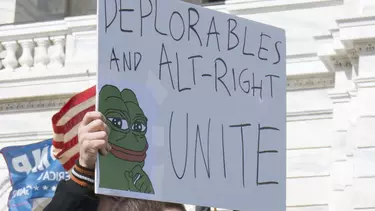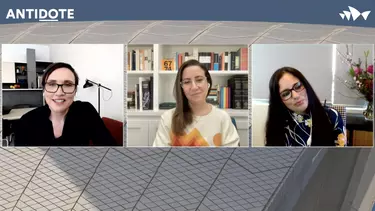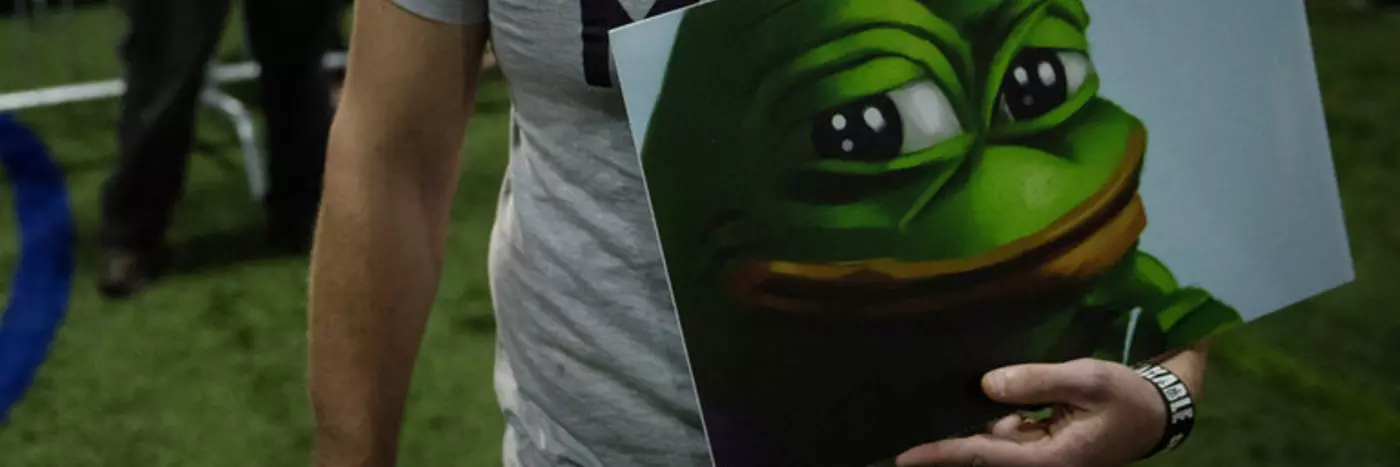Soul-searching with Pepe the Frog
Highly Commended in the Antidote and Sweatshop Mentorship for Diverse Emerging Writers, Tiffany Fong looks at the dangerous, cult-like appeal of the alt-right to a generation seeking community and meaning.
On a private Discord server I share with friends, Pepe the Frog gifs are common. There is something innocuously charming about the ugly green frog with bulging eyes, deep wrinkles and an even deeper-seated tiredness that many of us feel right now. We have spent over a year sitting at home, staring at blank walls, trying to stay on top of our responsibilities and make sense (or avoid) the general state of the world we are in. Pepe encapsulates this weariness and resignation.
While Pepe’s origins were harmless – a cartoon character from artist and illustrator Matt Furie’s ‘Boy's Life’ comic that first appeared in 2005 – the alt-right has appropriated the frog into a symbol of white nationalism. For those who aren’t so politically inclined, Pepe is often associated with humour and gaming culture (a success of Furie’s efforts to reclaim his character). Yet, I can’t help but do a double take whenever I see the frog.
In our globalised world, historic events seem to occur at unprecedented speed – we barely understand the impact of an event before we witness, record and archive the next global disaster. Amal Awad and Sarah Krasnostein’s panel ‘Soul-Searching in a Post-Truth Age’ for this year’s Antidote festival addresses how we seek and make meaning within our lives. Awad and Krasnostein both talk about how the stories we tell ourselves provide an illusion of stability and enable us to create a sense of community. However, they also acknowledge that these narratives can create division. As Awad states, “people will believe in something wholeheartedly because it gives them belonging and structure”.
The alt-right has decanted blame onto migrants for stealing jobs, onto women for the breakdown of the family unit, or onto governments for focusing too much on international affairs instead of domestic policy.

My friends and I could not pinpoint a singular historic event that has defined our collective imaginations and belief systems. We are too young to remember the impacts of 9/11, only understanding how the world changed through the filter of the American media.
Instead, perhaps we could point to Australia’s first female prime minister? Or maybe America’s first Black president? Or I could talk about the devastating Black Summer that wrecked Australia last year which was immediately followed by the global pandemic, closing our borders the same month we extinguished the last of the fires?
In trying to understand the peak of the alt-right and trace its origins, I end up at the 2016 presidential campaigns. It was widely assumed America’s first Black president would be followed by their first female president. At high school on the day of the elections, I remember a relative calm during the first period. Everyone had an eye on the electoral map out of curiosity, only for a general anxiety to set in by lunch when Trump had taken several swing states. By home time, Trump’s success was inevitable. In the evening, we simply awaited the formalities.
So, when the 2020 American presidential campaign began, I was no longer sure of the Democrats’ victory. Even when Biden’s presidency was officially announced, general apprehension remained about the handover and whether Trump would concede defeat. These fears would manifest in the Capitol Hill insurrection.

Each of these events over the last decade challenged the way I perceived the world. My digitally-connected generation is no longer simply affected by events that occur within our town, let alone our own country – international occurrences have an impact on our psyches too.
While I spent lockdown passively indulging in endless vlogs of people performing room makeovers and romanticising their daily lives through a Ghibli aesthetic, others spent time engaging in forums and social media, feeling increasingly frustrated at the complex problems that plague our world.
In searching for answers, Krasnostein observes that we may find ourselves “decanting impulses into simple stories of blame or anger, and who’s right or wrong”. The alt-right has decanted blame onto migrants for stealing jobs, onto women for the breakdown of the family unit, or onto governments for focusing too much on international affairs instead of domestic policy.
In online spaces like the Discord server my friends and I used as a virtual place to hang out during lockdown – watching movies, playing games online or complaining about assessments – the vast range of emotions conveyed through various iterations of Pepe means he is often used as a reaction gif alongside emojis and cat memes. Yet each time I see the frog, I inevitably think of Trump retweeting a representation of himself as Pepe during the 2016 presidential campaigns and how the alt-right effectively memed him into office.
If I was a different person, with a different set of lived experience, I wonder how susceptible I would be to the alt-right’s narratives of blame.
Awad observes that the people who are most susceptible to cult indoctrination are often “accomplished and healthy… because they have the urge for more and to make a difference in the world”. However, the growth of the alt-right amongst a range of classes, cultures and communities suggests a far-reaching appeal. Despite the blatantly racist, homophobic, and nationalist overtones of their ideology, the alt-right conveniently points people towards communities they can blame for their fears, without demanding any critical reflection on themselves and society.
If I was a different person, with a different set of lived experiences, I wonder how susceptible I would be to the alt-right’s narratives of blame. Perhaps much of my unease about the alt-right is because I can see its appeal for young people seeking some semblance of “belonging and structure” in our post-truth world.
The realisation frightens me.
